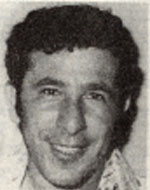Ozer, Jacob
Jacob was born in 1939 in Basra, Iraq, and immigrated to Israel at the age of eleven in 1950. Until the fourth grade of elementary school, he studied in his hometown After graduating from elementary school in Haifa, Yaakov was a diligent pupil and was among the best students in his class, but due to the difficult living conditions of the family and the frequent transitions, he was unable to continue his studies. Ashdod Aleph (now Beit Ezra), where he was cut off from school for a period of three years, during that time Yaakov, aged twelve, helped his family with working in agriculture. Only when the family moved to the Gulf City crossing near Haifa did he complete his studies at the local elementary school, after which he moved to the Kiryat Ono transit camp, where he studied the locksmith profession and began working in his profession in one of the metal shops in the city. he put all his energy at work and supported his parents, but after a short time he was called to serve in the IDF and stopped his work. Yaakov was drafted into the IDF in early February 1957. After completing his basic training he was sent to the drivers’ course, graduated with honors and was assigned to serve in the Armored Corps, and despite his driving as a driver, he traveled thousands of kilometers on Israel’s roads. His commanders knew him as a serious and responsible soldier and as a person who can always be relied upon, in any place and in any situation, and his friends in the unit remember him as an optimistic and cheerful guy who knew how to “party” raise the morale and his mood. in Yaakov’s company time passed quickly and the service passed pleasantly after he was discharged from the coastal service The manager of the factory learned quickly about Yaakov’s good qualities, his loyalty, his honesty and his responsibility, and he was not afraid to impose another challenge on him, and he asked Jacob to distribute the factory’s products throughout the country. And Yaakov divided his time Between the production of the products and the travel around Israel to distribute them, Yaakov married his wife and built his home in Kiron in 1967. After their first year of marriage, their eldest daughter Galit was born, and a year and a half later their son Moshe was born. He was a devoted father and a loving husband, whose family was always at the top of his worries. All he did and all his efforts in his work were devoted to assuring the welfare and future of his beloved family. Jacob was a happy man, a “heart of gold” who loved to help others. He was honest, decent, and loyal to his parents. Thanks to these qualities, he became familiar with all his acquaintances. He easily made friends and they liked to visit the warm house he had set up with the help of trimming. About a year before the outbreak of the Yom Kippur War, he decided to establish his family’s future and therefore left the Malko-Maltzim factory and began working as a taxi driver at the Shavit Taxi station in Givatayim. Even in this place of work, the superiors knew how to appreciate Jacob’s honesty and decency, which provided a good name for the station. During the Yom Kippur War, Yaakov took part in the bitter battles in the Golan Heights, in the role of a half-track driver, and his unit participated in blocking the Syrian forces, which broke out in the central sector towards Kibbutz Merom HaGolan and Ramat Magshimim on October 9, a direct hit hits a Katyusha and he was killed. He was laid to rest in the military cemetery in Kiryat Shaul. He left behind a wife, a daughter and a son, a mother, two sisters, and a brother. After his fall, he was promoted to sergeant. In a letter of condolence to the bereaved family, the defense minister wrote: “He was a devoted soldier and a loyal friend.
